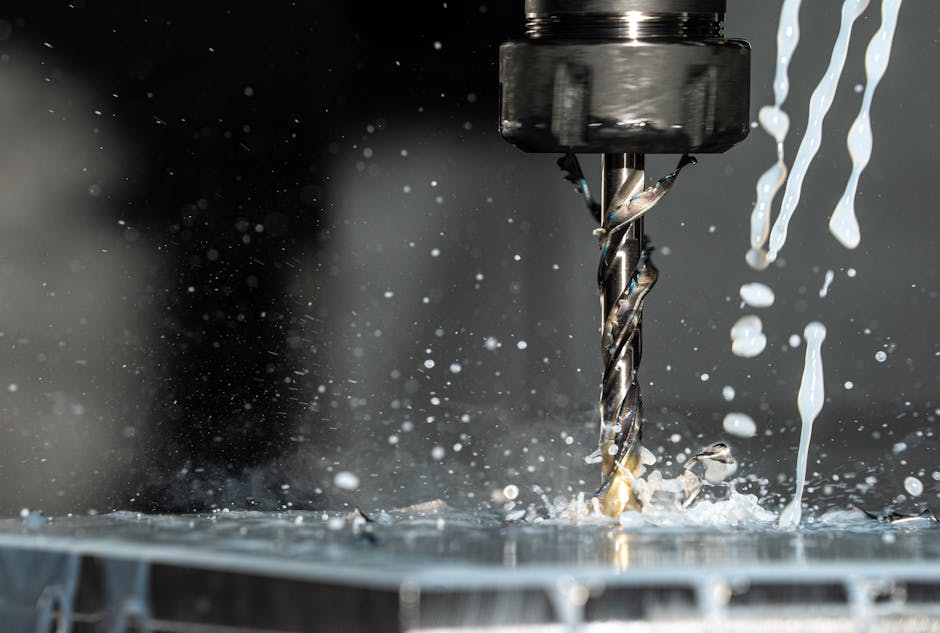Exploring the Versatility of CNC Turning in UK’s Manufacturing Sector
In the dynamic landscape of UK’s manufacturing sector, CNC turning has emerged as a pivotal technology, driving precision and efficiency. This exploration delves into the multifaceted versatility of CNC turning, unravelling its impact and potential across various industries.
From the evolution of CNC turning technology to its diverse applications in automotive and aerospace sectors, this enquiry aims to provide a comprehensive understanding of its significance. We will also examine the advantages it offers in manufacturing, including its ability to handle complex geometries and diverse materials.
Furthermore, this exploration will shed light on the future trends and innovations that are shaping the realm of CNC turning in the UK, offering valuable insights for industry professionals and enthusiasts alike.
Key Takeaways
- CNC turning technology in the UK’s manufacturing sector has evolved significantly, leading to enhanced efficiency and accuracy.
- CNC turning offers high precision and complexity, thanks to the integration of advanced software, cutting-edge tools, and innovative techniques.
- CNC turning plays a crucial role in the automotive industry, creating intricate components with high precision, complex geometries, and consistent quality.
- CNC turning is indispensable in the aerospace sector for producing complex components with unparallelled accuracy, reducing lead times, and enabling cost-effective manufacturing.
Evolution of CNC Turning Technology

Periodically, CNC turning technology has undergone significant evolution, revolutionising the manufacturing processes in the UK. The evolution of CNC turning has been marked by continuous advancements in precision machining, leading to enhanced efficiency and accuracy in the production of intricate components.
Initially, CNC turning was limited in its capabilities, with basic functionalities and lower precision levels. However, over time, technological advancements have propelled CNC turning into a realm of high precision and complexity, enabling manufacturers to achieve meticulous and intricate designs with utmost accuracy.
The evolution of CNC turning technology has been characterised by the integration of advanced software, cutting-edge tools, and the implementation of innovative techniques. These developments have contributed to the transformation of manufacturing processes, allowing for the production of highly intricate parts with unparallelled precision.
As CNC turning technology continues to advance, manufacturers in the UK are presented with a myriad of opportunities to elevate their production capabilities and meet the growing demands of various industries.
This evolution sets the stage for exploring the advantages of CNC turning in manufacturing, shedding light on its profound impact on the industrial landscape.
Advantages of CNC Turning in Manufacturing

The continuous advancements in CNC turning technology have significantly enhanced the manufacturing processes in the UK, providing manufacturers with a multitude of advantages in precision, efficiency, and complexity.
CNC turning offers a remarkable advantage in improving efficiency as it enables high-speed production with minimal human intervention. This automation not only reduces the time required for manufacturing but also ensures consistent and accurate output, leading to a significant reduction in waste.
The precision and accuracy achieved through CNC turning are unparallelled, leading to minimal material wastage and rework. Additionally, the ability of CNC turning to handle complex geometries and intricate designs further amplifies its advantages in manufacturing.
By reducing the need for manual intervention and streamlining the production process, CNC turning optimises resource utilisation and enhances overall operational efficiency.
Consequently, manufacturers in the UK are increasingly embracing CNC turning as a pivotal technology that not only improves efficiency but also reduces waste, ultimately contributing to sustainable and cost-effective manufacturing practises.
Diverse Applications in Automotive Industry

Diversifying its reach, CNC turning optimises resource utilisation and enhances overall operational efficiency, making it a vital technology in the automotive industry. CNC turning plays a crucial role in automotive production, where precision engineering is paramount. The use of CNC turning in the automotive sector encompasses a wide range of applications, from creating intricate components for engines and transmissions to producing precise parts for steering and suspension systems. Below is a table highlighting specific components where CNC turning is extensively applied in the automotive industry:
| Automotive Component | CNC Turning Application | Benefits |
|---|---|---|
| Engine Components | Cylinder heads, crankshafts | High precision, complex geometries |
| Transmission Parts | Gears, shafts | Consistent quality, tight tolerances |
| Steering Systems | Steering shafts, gears | Smooth operation, enhanced performance |
| Suspension Components | Axles, bushings | Improved durability, reduced vibration |
| Brake System Parts | Rotors, callipers | Enhanced safety, heat dissipation |
This table illustrates how CNC turning contributes to the production of critical automotive parts, ensuring high precision and quality while meeting the demands of modern automotive engineering.
Impact of CNC Turning on Aerospace Sector

With a growing demand for precision engineering and stringent quality standards in the aerospace sector, CNC turning has become an indispensable technology for producing complex components and ensuring consistent performance. The impact of CNC turning on the aerospace sector is profound, revolutionising the manufacturing processes and capabilities in this industry.
Key points to consider are:
-
Enhanced Precision: CNC turning enables the production of intricate aerospace components with unparallelled accuracy, meeting the exacting standards of the industry.
-
Efficiency in Manufacturing: The technology streamlines the manufacturing process, reducing lead times and enhancing overall productivity, which is crucial in the aerospace sector.
-
Utilisation of Innovative Materials: CNC turning facilitates the machining of innovative materials, such as titanium alloys and composites, which are prevalent in modern aerospace designs.
-
Cost-Effective Production: By minimising material waste and optimising production cycles, CNC turning contributes to cost-effective manufacturing of aerospace components.
Material Versatility and Complex Geometries

Manufacturers in the UK’s manufacturing sector are harnessing the potential of CNC turning to achieve material versatility and produce components with complex geometries. CNC turning allows for the machining of a wide range of materials, including metals, plastics, and composites, offering exceptional material compatibility. This versatility is vital for meeting the diverse requirements of industries such as aerospace, automotive, and medical equipment manufacturing.
CNC turning enables precision machining, allowing for the creation of intricate and complex geometries with high accuracy and repeatability. The ability to work with various materials and achieve complex geometries is crucial for producing components that meet stringent performance and quality standards.
Future Trends and Innovations in CNC Turning

As CNC turning continues to evolve, advanced tooling technologies are expected to play a crucial role in enhancing precision and efficiency.
Additionally, the integration of automation and robotics is anticipated to revolutionise the manufacturing process, reducing human intervention and enhancing productivity.
Furthermore, the industry is gearing towards sustainable machining practises, with a focus on minimising waste and energy consumption to aline with environmental concerns and regulations.
Advanced Tooling Technologies
The incorporation of advanced tooling technologies in CNC turning is driving innovation and efficiency in the UK’s manufacturing sector. Tooling innovations are revolutionising precision machining, leading to enhanced productivity and quality.
Some of the current trends and innovations in CNC turning tooling include:
- Adoption of advanced carbide inserts for improved tool life and cutting performance.
- Integration of high-speed tooling technologies to enhance machining efficiency and reduce lead times.
- Utilisation of advanced tool coatings such as TiAlN and TiCN to increase tool durability and reduce friction during cutting operations.
- Implementation of smart tooling technologies with imbedded sensors for real-time monitoring of tool conditions and predictive maintenance.
These advancements are shaping the future of CNC turning, empowering manufacturers to achieve higher precision, productivity, and cost-effectiveness.
Automation and Robotics
Advancing the field of CNC turning, innovative automation and robotics technologies are revolutionising manufacturing processes and driving increased efficiency and precision in the UK’s manufacturing sector. Robotic integration in CNC turning offers numerous benefits, including enhanced productivity, reduced lead times, and improved workplace safety. Moreover, automation streamlines operations, leading to cost savings and improved resource allocation. A key advantage of automation is its ability to handle repetitive tasks with consistent accuracy, freeing up skilled workers to focus on more complex and value-added activities.
| Automation Benefits | Robotic Integration |
|---|---|
| Enhanced Productivity | Increased Efficiency |
| Cost Savings | Improved Precision |
| Reduced Lead Times | Enhanced Safety |
| Resource Allocation | Consistent Accuracy |
| Improved Workplace Safety | Streamlined Operations |
Sustainable Machining Practises
In the context of CNC turning in the UK’s manufacturing sector, sustainability in machining practises is an increasingly critical focus for driving future trends and innovations. Sustainable practises not only reduce environmental impact but also lead to more efficient operations, ultimately benefiting both businesses and the environment.
Key trends and innovations in sustainable CNC turning include:
- Implementation of energy-efficient machining technologies
- Adoption of eco-friendly cutting fluids and lubricants
- Integration of advanced recycling and waste reduction systems
- Development of intelligent machining strategies to minimise material waste and optimise resource utilisation
These trends and innovations are shaping the future of CNC turning, promoting environmentally conscious and efficient practises that aline with the evolving needs of the manufacturing sector.
Frequently Asked Questions
How Does the Use of CNC Turning Technology in the UK Compare to Other Countries?
In comparing the use of CNC turning technology in the UK to other countries, it is evident that the UK has made significant technological advancements, enhancing its global competitiveness. Market trends indicate a strong emphasis on precision and efficiency.
What Are the Specific Challenges and Opportunities for CNC Turning in the UK Manufacturing Sector?
Challenges in UK manufacturing include adapting to technological advancements in CNC turning. Opportunities lie in workforce training to meet demand. Balancing the need for skilled labour and automation presents a unique challenge for the UK manufacturing sector.
How Do CNC Turning Machines Contribute to Sustainability and Environmental Impact in Manufacturing?
CNC turning machines contribute to sustainability and reduced environmental impact in manufacturing through precision cutting, minimising material waste, and energy-efficient operations. Sustainable practises in CNC turning support resource conservation and eco-friendly production processes.
What Are the Potential Risks and Limitations of CNC Turning Technology in the Uk?
Potential risks of CNC turning in the UK include machine maintenance challenges, regulatory compliance requirements, and the need for operator training. It is crucial for manufacturers to address these limitations to ensure safe and efficient operations.
How Are UK Manufacturers Adapting to the Increasing Demand for Precision and High-Quality Components in CNC Turning?
UK manufacturers are adapting to the increasing demand for precision and high-quality components in CNC turning by implementing advanced technologies, optimising production processes, and investing in skilled workforce training to ensure efficient and accurate manufacturing.
Conclusion
In conclusion, CNC turning has carved its place as a versatile and indispensable tool in the UK’s manufacturing sector.
Like a master craftsman, it has evolved to meet the demands of diverse industries, shaping raw materials into complex and precise components.
Its impact on the automotive and aerospace sectors is profound, and its ability to work with a variety of materials and geometries ensures its relevance for the future of manufacturing.
Contact us to discuss our services now!
